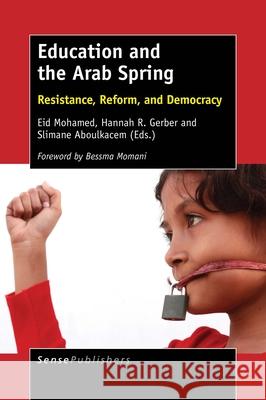Education and the Arab Spring » książka
Education and the Arab Spring
ISBN-13: 9789463004701 / Angielski / Twarda / 2016 / 186 str.
Education and the Arab Spring
ISBN-13: 9789463004701 / Angielski / Twarda / 2016 / 186 str.
(netto: 421,88 VAT: 5%)
Najniższa cena z 30 dni: 423,64
ok. 22 dni roboczych.
Darmowa dostawa!
Education and the Arab Spring: Resistance, Reform, and Democracy explores the current debate about education in the Middle East and North Africa post-Arab Spring. It draws from a variety of conceptual frameworks rooted in different disciplines and fields, such as education, religious and cultural studies, political science, and Arab studies. The book is, in part, a response to an increased demand since the Arab Spring - by universities, cultural institutions, think-tanks, education officials, policymakers and journalists - for a richer, deeper understanding of the role of education in post-Arab Spring states and societies. The book adds a unique and much-needed perspective to this field: its specific focus is on the Arab context, and its analysis is of issues of particular relevance to a changing world order. The great mix of experiences of the contributors attests to the excellent quality of this promising work. "It is not infrequent to hear sweeping but general criticisms of all aspects of educational systems in the Arab world - everything from textbooks to teaching methodologies have come under scrutiny. The authors of this collection seek to move the debate beyond generalities by providing detailed studies; while informed by a sense of the inadequacy of existing systems, they also provide an empirically rich analysis of existing systems." - Nathan Brown, George Washington University, USA
Education and the Arab Spring: Resistance, Reform, and Democracy explores the current debate about education in the Middle East and North Africa post-Arab Spring. It draws from a variety of conceptual frameworks rooted in different disciplines and fields, such as education, religious and cultural studies, political science, and Arab studies. The book is, in part, a response to an increased demand since the Arab Spring - by universities, cultural institutions, think-tanks, education officials, policymakers and journalists - for a richer, deeper understanding of the role of education in post-Arab Spring states and societies. The book adds a unique and much-needed perspective to this field: its specific focus is on the Arab context, and its analysis is of issues of particular relevance to a changing world order. The great mix of experiences of the contributors attests to the excellent quality of this promising work."It is not infrequent to hear sweeping but general criticisms of all aspects of educational systems in the Arab world - everything from textbooks to teaching methodologies have come under scrutiny. The authors of this collection seek to move the debate beyond generalities by providing detailed studies; while informed by a sense of the inadequacy of existing systems, they also provide an empirically rich analysis of existing systems." - Nathan Brown, George Washington University, USA











